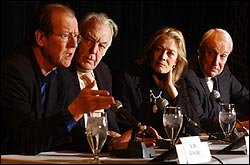The Hollow Crown
Golden rule sets stage
Veteran British actors talk monarchy as opening
night of Hollow Crown looms
|
If the cast of The Hollow Crown are as
fascinating onstage as they were at yesterday's news conference (and there's no
reason to doubt they will be), then Toronto audiences are in for a treat. The
quartet of veteran British actors (Vanessa Redgrave, Donald Sinden, Ian
Richardson and Alan Howard) who comprise the company of the show that's opening
this Thursday night brought a warmth and charm to the lounge of the Princess Of
Wales Theatre that went a long way toward obliterating the winter storm raging
outside.
Richardson began speaking for the group. He's
perhaps best known for his wicked turn as the Machiavellian Francis Urqhart on
the 1990 political miniseries, House Of Cards, with his catch-phrase, "I
couldn't possibly comment." |

|
He was certainly available for attribution yesterday
when he described The Hollow Crown, devised and directed by John Barton,
as a collection of "speeches, documents, gossip and music, associated with the
British monarchy from William the Conqueror up to Queen Victoria."
Richardson has been a part of the show (on and off)
since shortly after its first performance in 1961 (he shared the stage with
Redgrave on that occasion) and he dryly observed that "every member of the
Royal Shakespeare Company - present, past or passed-on - has participated in it
at one time or another." He hastened to assure reporters that "this is not in
any way trying to ram British monarchy down your throats. It is as critical of
the monarchs as you, a fine North American audience, would want us to
be."
If Richardson's wit is like a dry sherry, then
Sinden's resembles a full-bodied port, rich and mellow. The expansive performer
who will be remembered for his TV stints on Doctor In The House and
Two's Company (opposite Elaine Stritch) has played Toronto before, in a
1974 production of London Assurance at the Royal Alex. He feels the show
"should be called The Foibles of The Kings and Queens of England. It's one of
the most astonishing pieces of theatre I've ever been in. Four actors get to
show off their wares and every single piece we present tells a different
story."
Howard's approach is more analytical - like the
multi-faceted depth of a single malt. Although the possessor of an impressive
theatrical resumé, his most recent claim to fame is that he can be heard
as the voice of The Ring, in The Lord Of The Rings trilogy. He delights
in the work's complexity.
"It contains all the absurdities and profundities of
the institution. Just like Shakespeare's histories ... every generation will
have their own slant on it.
"There's no easy answer to the issue of the
monarchy. It's neither `What a load of bollocks!' or `The most wonderful thing
that ever happened!' It's an explanation of why societies have to have some
mysterious figure up top, whether it's absurd or profound."
By now, all eyes were on Redgrave, waiting for her
take on the matter. She's the best known of the quartet, for Oscar-winning
performances like Julia, Emmy-winning programs like Playing For
Time, or her recent Tony-winning triumph in Long Day's Journey Into
Night, but her outspoken political opinions also make her someone whose
every word you anticipate.
When she speaks, it's vintage champagne: heady,
subtle and unforgettable.
"It all goes beyond the issue of monarchy," she
begins. "It's really the issue of power, of authority, and what
responsibilities and duties are attached to it." She pauses, a score of
unspoken names flashing through her mind, before she says,
"And what people should or should not be trusted with
it."
Redgrave resists questions that try to tug her into
the present and remains in her admiration for the voices of the past. "Those
monarchs were unafraid for their words to be heard. For good or for bad, they
say `This is me.' They have that kind of authority which announces `This is
what I think, come what may.'"
Her cool eyes look out at all of us. "Today's
speeches are written for other people to read. They don't come from here," she
says, lightly touching her heart, "and that personal pledge which was
significant for many centuries has gone." While Redgrave's words hang in the
air, Sinden hastens to assure us that the evening, despite the gravity of its
themes, will provide "plenty of laughter."
But Howard asks one more question. "The monarchy:
What do you do with it, or what do you do without it?"
Redgrave sums it up. "Who gives the power? Who
receives the power? And what effect does it have on all of us?"
It looks like The Hollow Crown may be very
full indeed.
Richard Ouzounian
Toronto Star,
27.1.04
